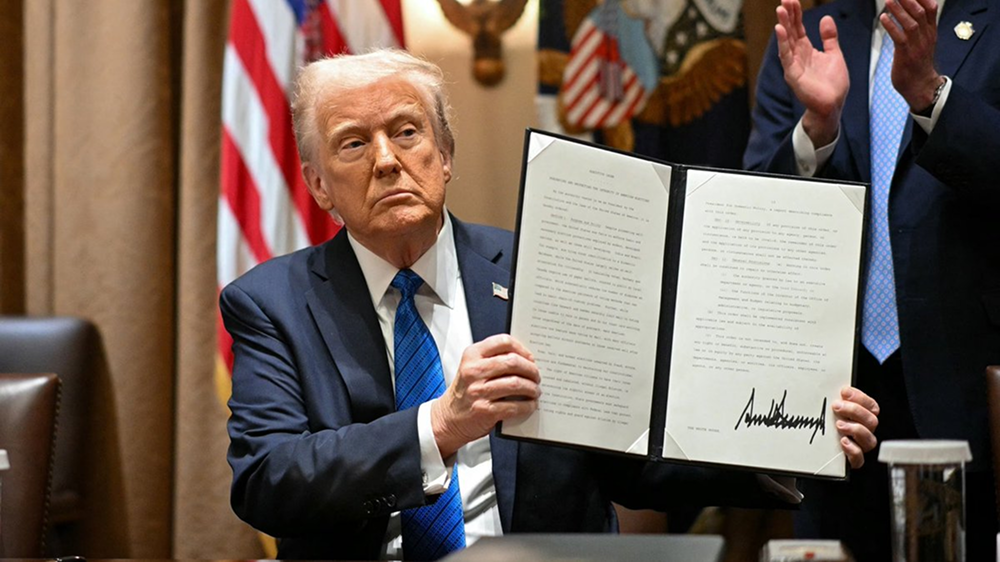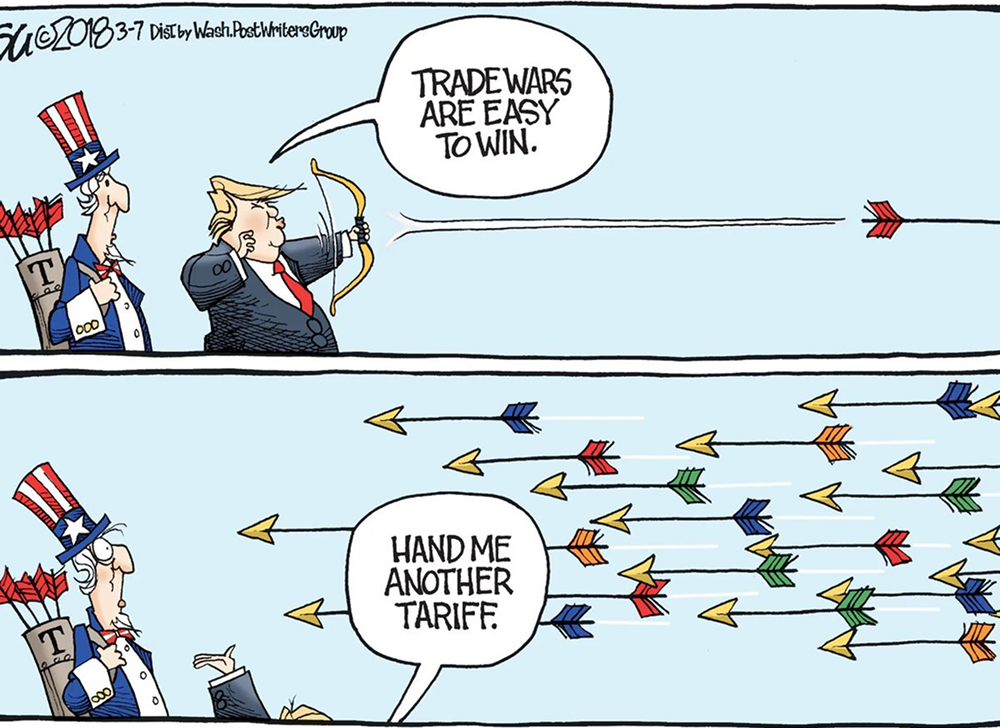The 104% tariff imposed by the United States on Chinese goods will officially take effect at 12:01 AM Eastern Time on April 9 (12:01 PM Beijing Time on April 9). This tariff policy was pushed by the Trump administration and includes the previously implemented 20% and 34% tariffs, as well as the newly announced 50% tariff, marking a new height in the China-U.S. trade war. Meanwhile, Trump posted on the social platform Truth Social that he is waiting for China's response and stated, "China is eager to reach an agreement, they just don't know how to start." This move poses a threat not only to the global supply chain but also brings new uncertainties to the cryptocurrency market.

Details of Tariff Composition and Effectiveness
The composition of the 104% tariff is clear: 20% comes from Trump's earlier general tariff on Chinese goods, 34% is the "reciprocal tariff" announced earlier this year, and the latest additional 50% was confirmed after Trump issued a "final ultimatum" via Truth Social on Monday (April 7). White House spokesperson Karoline Leavitt confirmed at a press briefing on Tuesday that this tariff measure will take effect at 12:01 AM Eastern Time on April 9 and emphasized that Trump "will not tolerate" any retaliatory actions from China. She stated, "When the U.S. gets punched, the President will hit back harder."
According to online information integration, the White House has clarified the exemption scope for certain goods, including strategic materials such as rare earth minerals, pharmaceuticals, gold, and semiconductors, which will maintain a 20% tariff. However, all other Chinese goods exported to the U.S. will face the 104% super high tariff. Additionally, the U.S. plans to impose fees of up to $1.5 million on Chinese ships entering ports, a measure that may force Chinese shipping to turn to transshipment trade, further exacerbating the restructuring of the global logistics landscape.
Trump's Negotiation Stance and Global Reactions
Trump revealed on Truth Social that he has spoken with the acting President of South Korea regarding trade surpluses and tariff issues and stated that he is engaged in similar negotiations with multiple countries. He specifically mentioned, "China is also eager to reach an agreement, and we are waiting for their call. This will definitely happen." This statement shows that Trump is trying to force trade partners back to the negotiating table through high-pressure tariff policies while demonstrating confidence in the U.S. economic dominance. However, the Chinese Ministry of Commerce quickly responded, stating that they will "accompany to the end" and strongly criticized the U.S. actions as "unilateral bullying," indicating that both sides remain firm in their positions.
Globally, Trump's tariff policy has raised widespread concerns. French President Macron called for European companies to suspend investments in the U.S., while Japanese Prime Minister Kishida expressed "strong concern." According to the Financial Times, since Trump's first term, global companies have committed to investing at least $1.9 trillion in the U.S., involving giants like Apple, Hyundai, and SoftBank. However, the uncertainty of the new round of tariffs may make the U.S. lose its investment attractiveness, with some companies already beginning layoffs or adjusting their supply chain layouts. Experts warn that if the tariff war continues to escalate, the U.S. may transform from a "hopeful place for manufacturing return" to "a less attractive investment destination."
Impact on Global Supply Chain and Cryptocurrency Market
The impact of this tariff increase on Chinese goods is particularly significant. In 2024, the total trade volume of goods between China and the U.S. is approximately $585 billion, with the U.S. importing $440 billion from China, far exceeding the $145 billion exported to China. High tariffs will significantly increase the cost of Chinese goods in the U.S., particularly affecting key categories such as smartphones, electronics, and batteries. Apple has already seen its stock price drop by 20% due to tariff pressures, while U.S. companies relying on Chinese supply chains face difficult choices of profit compression or cost transfer.
For the cryptocurrency market, the impact of this event is also profound. First, the inflationary pressure caused by tariffs may prompt the Federal Reserve to adjust monetary policy, and higher interest rates typically pose a negative impact on crypto assets. Second, China dominates the global refining of key metals (such as lithium, copper, and rare earths), and if China restricts the export of these metals in retaliation, the production costs of blockchain hardware will rise, affecting mining machine manufacturing and mining economics. Additionally, the tariff war may accelerate the strength of the dollar, leading to fluctuations in the demand for decentralized assets like Bitcoin as safe-haven investments.
Warnings from Economists and Industry
Economists generally believe that the 104% tariff will significantly raise consumer prices in the U.S. and may lead to the fragmentation of the global economy. Analysis from the National Bureau of Economic Research shows that the tariffs during Trump's term from 2017 to 2020 have already caused U.S. consumers to bear most of the costs, and this new tariff level may have an impact five times greater than before. JPMorgan has raised the probability of a U.S. recession from 40% to 60%, while Goldman Sachs predicts a 35% risk of recession in the next 12 months. Analysts at Wall Street investment bank Wedbush Securities pointed out that the tariffs imposed on China are "stunning" and will reshape the global trade landscape.
In the cryptocurrency field, industry insiders are concerned about the potential impact of supply chain disruptions on hardware wallets and mining equipment production. Meanwhile, if the China-U.S. trade war escalates further, investors may turn to stablecoins or gold as safe-haven assets rather than high-volatility cryptocurrencies. However, some believe that in the long run, the trade war may weaken the dollar's hegemony, providing new narrative space for assets like Bitcoin.

Conclusion
The implementation of the 104% tariff on Chinese goods by the U.S. marks another radical attempt by Trump's trade policy. This move not only challenges China-U.S. bilateral relations but also poses a severe test to the global supply chain and investment confidence. For the cryptocurrency market, short-term inflation and supply chain pressures may bring volatility, but the long-term impact remains to be seen. In this uncertain time, investors need to closely monitor policy trends and market reactions to address potential risks and opportunities.
This article represents the author's personal views and does not reflect the position and views of this platform. This article is for information sharing only and does not constitute any investment advice to anyone.
AiCoin official website: aicoin.com
Telegram: t.me/aicoincn
Twitter: x.com/AiCoinzh
Email: support@aicoin.com
Group chat: Customer Service Yingying、Customer Service KK
免责声明:本文章仅代表作者个人观点,不代表本平台的立场和观点。本文章仅供信息分享,不构成对任何人的任何投资建议。用户与作者之间的任何争议,与本平台无关。如网页中刊载的文章或图片涉及侵权,请提供相关的权利证明和身份证明发送邮件到support@aicoin.com,本平台相关工作人员将会进行核查。



